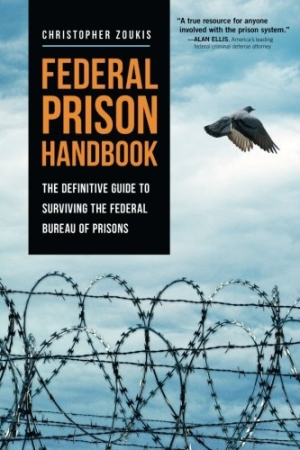Federal Prison Handbook
The Definitive Guide to Surviving the Federal Bureau of Prisons
- 2017 INDIES Winner
- Bronze, Social Sciences (Adult Nonfiction)
The author doles out plenty of factual data, but injects his own hard-won advice about prison culture.
Longtime federal prisoner Christopher Zoukis has written an authoritative and highly detailed compendium of necessary information for prisoners and their families: Federal Prison Handbook: The Definitive Guide to Surviving the Federal Bureau of Prisons. The author is articulate and measured in his delivery of essential information about navigating the federal corrections bureaucracy, whether one is a new or veteran inmate, family member, or legal advocate or activist. He evokes the realities of prison life from intake to release and provides a valuable resource for the one in one hundred Americans who are currently incarcerated and those who care about them.
The book is clearly written and organized. Sections are devoted to the many aspects of prison life, ranging from the different kinds of prison work assignments to how to appeal a disciplinary action to how to avoid fights. The author doles out plenty of factual data, but injects his own hard-won advice about prison culture and the mental effects of an overcrowded, stressful, and monotonous environment. Frequent sidebar tips offer less formal but no less important advice, like how to interact with corrections officers (be courteous but not too friendly, to avoid being dangerously perceived as an informant) or how families should contact prison chaplains in the event of a family emergency or death to alert prisoners more quickly.
While most of the book has a cool, matter-of-fact tone, there are sections that vividly recall the author’s experiences or those of other prisoners he interviewed. He is a passionate advocate of reform for the way the Special Housing Unit (SHU) is used. Zoukis himself spent five months in the SHU for an incident for which he was later exonerated; his family had to pay huge legal fees to secure his release back to the general prison population. Another cost of his time in solitary confinement was to his mental health—he had thought that the “monotony, boredom and uncertainty might kill me.” His chronicle of the daily indignities of everything from no toilet paper to the lack of contact with the outdoors and other human beings is powerful.
Most of the book covers the rules and regulations that govern routine prison life, but as a thorough guide, Zoukis also discusses activities he considers ill-advised, like buying and selling contraband, gambling, tattoos, and sex. Perhaps Zoukis’s best advice is about how to come through federal imprisonment as one of the third of inmates that he describes as focused and self-directed, who are able to move forward from a degrading and stressful situation to a meaningful and rewarding post-prison life.
Packed with good information and extensive appendixes listing correspondence programs, books, prisoner groups, and other resources, Federal Prison Handbook is an important reference for federal prison newcomers and even longtime prisoners who want fuller knowledge of their rights within the federal prison system.
Reviewed by
Rachel Jagareski
Disclosure: This article is not an endorsement, but a review. The publisher of this book provided free copies of the book and paid a small fee to have their book reviewed by a professional reviewer. Foreword Reviews and Clarion Reviews make no guarantee that the publisher will receive a positive review. Foreword Magazine, Inc. is disclosing this in accordance with the Federal Trade Commission’s 16 CFR, Part 255.

